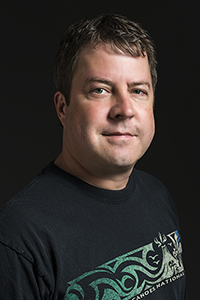You’re accessing archived content
This is archived content from the UIT website. Information may be outdated, and links may no longer function. Please contact stratcomm@it.utah.edu if you have any questions about archived content.
$1.5M NSF award to address research computing, data challenges
CHPC's Cheatham to help open career center
Adapted from a news release by Internet2

Tom Cheatham, CHPC director
Tom Cheatham, director of UIT’s Center for High Performance Computing at the University of Utah, has been named a co-principal investigator on a nearly $1.49 million, two-year grant from the National Science Foundation (NSF) meant to address challenges presented by research computing and data (RCD) infrastructure and services. The U is part of a team that includes Internet2, Harvard University, and the University of California San Diego.
Research is increasingly dependent upon RCD infrastructure and services, and researchers are struggling to keep pace with the explosion of data and the rapidly evolving computing landscape. Having access to RCD professionals who have the technology expertise and understanding of research workflows is invaluable to a researcher, but institutions face challenges recruiting and retaining RCD professional staff, as well as building and sustaining effective RCD support services.
With a focus on advocacy, training, and workforce development, an NSF-funded Cyberinfrastructure Centers of Excellence (CI CoE) pilot will develop a Research Computing and Data Resource and Career Center that provides institutions and individuals with the products, tools, services, and community to build and sustain successful RCD operations.
A key component of this effort is to help develop new RCD professionals and support them throughout their careers.
“We want to recruit more people in the research computing and data profession, and ensure that they have the tools and professional development opportunities to succeed at doing their jobs,” Dana Brunson, executive director for research engagement at Internet2 and the grant’s principal investigator, said in a news release. “We will also bring together organizations that support RCD professionals across the larger ecosystem. We want to openly collaborate with them on the development of a shared voice that advocates for this new profession, and work together to increase diversity, equity, and inclusion.”
Building upon the success of the NSF-supported Campus Research Computing Consortium (CaRCC), the grant will support a more robust and sustainable implementation of the RCD capabilities model that provides an assessment framework, support for benchmarking and strategic planning, and a community dataset to understand the landscape of RCD support.
Among the goals of the pilot program is to develop resources for staff training and workforce development, which include leading practices for recruitment, onboarding, advancing diversity, equity and inclusion, professional development, and proven models for student internship and training programs.
“The research computing and data roles are not well understood and supported by institutions, and this has made recruitment and retention of top talent very challenging,” Patrick Schmitz, founder and principal consultant at Semper Cogito Consulting and co-principal investigator on the grant, said in the release. “There is a real need to implement structural changes, to provide training and resources that will expand the pipeline into these roles, and to advance the profession as a whole.”
In addition to training and workforce development, the pilot will create and share a model of career arcs for RCD professionals to explain career options and help existing RCD professionals explore professional development and advancement opportunities.
The team plans to use the pilot period to facilitate the creation of a coordinating organization that connects all the relevant communities that can benefit from RCD support, and develop a shared voice for RCD professionals, with plans for a fully-operational CoE.
Node 4
Our monthly newsletter includes news from UIT and other campus/ University of Utah Health IT organizations, features about UIT employees, IT governance news, and various announcements and updates.
